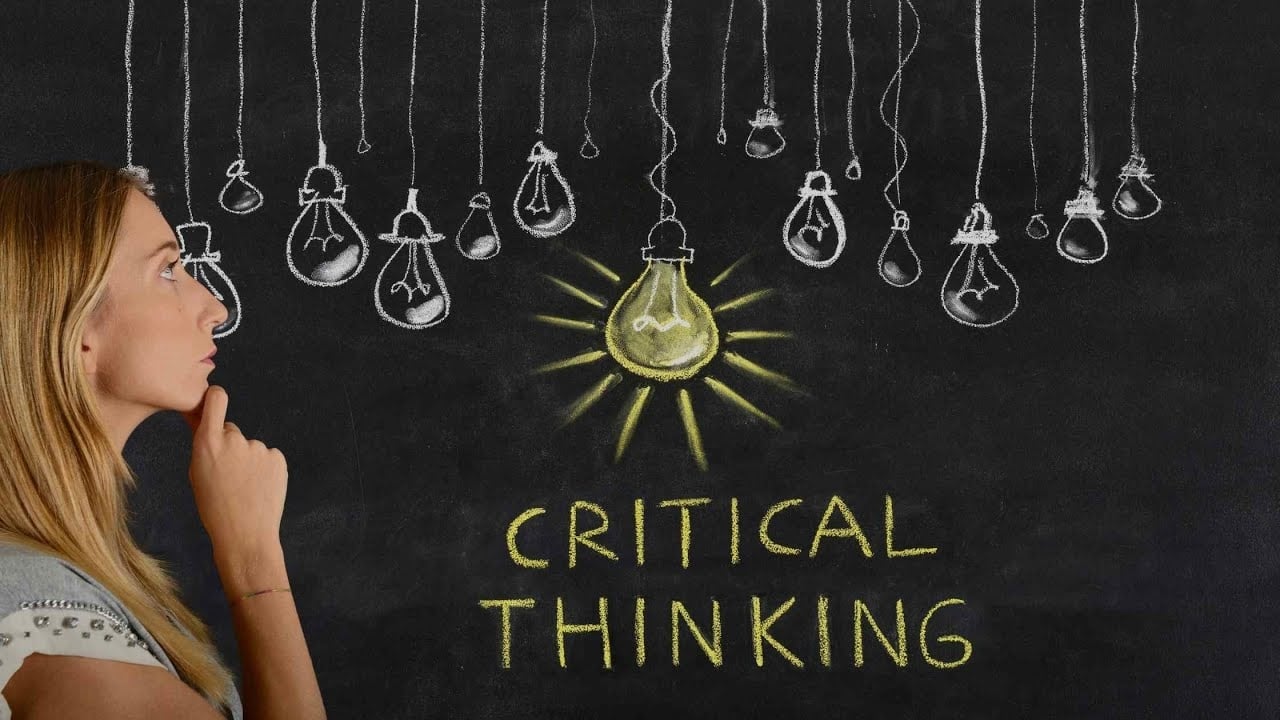Critical thinking is a dynamic cognitive process that involves purposeful analysis, decision-making, and logical reasoning, not just an academic endeavor.
As we navigate a complex information landscape, understanding how critical thinking shapes individual perspectives, decision-making, and problem-solving becomes essential. We also highlight the broader influence of a society that values and fosters critical thinking, exploring how this intellectual skill contributes to enlightened citizenship, innovation, and societal resilience in facing evolving challenges. Stay tuned as we explore the different levels of critical thinking and examine its role as a driving force behind social progress and intellectual development.
What Is Critical Thinking?
Critical thinking is an advanced cognitive process that includes a set of essential intellectual skills necessary to grapple with the complexities of today's world. Fundamentally, it entails active and reflective analysis of information, arguments, and ideas. Engaged people probe deeper than the obvious, challenging the presumptions that underlie the material offered to gain better knowledge.
This method calls for intellectual honesty and an analytical attitude. It urges people to assess the credibility of their sources, identify biases, and distinguish between assertions supported by evidence and mere opinions. Critical thinking extends beyond assessing information; it includes creative problem-solving and encouraging people to explore innovative solutions to complex challenges.
Moreover, critical thinking is a dynamic skill that evolves through exposure to diverse perspectives and experiences and enhances adaptability and flexibility by fostering a willingness to reconsider situations in light of new information.
This skill can be applied in various contexts, including daily decision-making, professional pursuits, and intellectual pursuits. It's not a fixed trait but rather a mindset cultivated through practice and continuous improvement. It includes developing analytical thinking, effective communication, and collaborative skills.
In a larger sense, societies that value and promote critical thinking thrive on having intellectually capable citizens. Critical thinkers contribute significantly to democratic processes by making informed decisions, engaging in productive conversations, and advocating evidence-based policies. Thus, the value of critical thinking goes beyond personal growth; it plays a pivotal role in shaping enlightened, inventive, and resilient societies prepared to face the challenges of the 21st century.
Being Able to Think Critically Entails Being Self-Reliant and Productive
Critical thinking is the backbone of intellectual empowerment. It influences several aspects of the cognitive landscape and contributes to comprehensive personal development. This cognitive skill requires disciplined examination of information, analysis, evaluation, and instilling a sense of intellectual independence. When one engages in critical thinking, they refine their ability to challenge assumptions, distinguish between valid and invalid arguments, and navigate the complex web of knowledge with acuity.
Beyond the academic context, critical thinking's impacts resonate deeply in problem-solving scenarios. Proficient critical thinkers break down complex issues, identify root causes, and derive enlightened strategic solutions. This improves their decision-making ability and increases their success in volatile situations.
Furthermore, effective communication and critical thinking go hand in hand. People who work on these skill sets get better at expressing themselves clearly, coherently, and compellingly. They also learn to appreciate different points of view and engage in meaningful conversation while communicating challenging ideas. Above all, committing to critical thinking fuels a spirit of continuous learning, encouraging people to look for new information, assess emerging ideas, and adapt their perspectives in response to the body of knowledge.
Fundamentally, critical thinking has transforming impacts on both the personal and professional spheres. It allows flexible and resilient people to approach problems with analytical accuracy. Outside of the boundaries of academic endeavors, critical thinking is a road map for navigating the complexity of today's world, as it fosters growth, flexibility, and the capacity to make meaningful contributions to society.

Critical Thinking Translates to a Cohesive Society and a Strong Nation
Critical thinking transforms society; it promotes societal advancement on many fronts and builds into the structure of collective consciousness. A critical-thinking public represents a buffer against false information and supports citizens who can distinguish between reliable sources and baseless allegations. This intellectual flexibility becomes particularly crucial in the context of democratic societies, as an informed voting base is a fundamental element in the functioning of democratic processes.
These effects extend beyond individual decision-making and penetrate areas of creativity and problem-solving. A society that values critical thinking nurtures a culture of curiosity and encourages people to question norms, challenge assumptions, and explore new ideas. This fosters an environment conducive to creativity, where diverse perspectives converge to tackle complex challenges.
Moreover, critical thinking fosters socially productive communication and cultivates effective communication within society. Citizens equipped with critical analytical skills are better prepared to engage in meaningful conversation and appreciate diverse viewpoints while constructing logical arguments.
This improves the standard of conversation and helps communities become more inclusive and cooperative. Embracing critical thinking systematically within society fosters a cycle of positive feedback and benefits institutions, companies, and management structures through applying creative thinking and logical decision-making by critically engaged citizens.
Critical thinking's long-term effects on society create an environment that is open to innovation, informed citizenship, and creativity. As societies increasingly recognize the value of critical thinking, the possibility of a clearer positive societal transformation becomes more evident, setting the pace for a resilient, adaptable, and intellectually vibrant community spirit.
How Can We Help Kids Develop Critical Thinking?
Instilling critical thinking skills in children is a multifaceted process that involves fostering an investigative mindset, encouraging exploration, and providing diverse educational experiences. First and foremost, it is crucial to create an environment where questions are welcomed and actively encouraged. Teachers and parents can nurture curiosity by responding to children's inquiries with thoughtful answers stimulating further exploration.
Integrating inquiry-based learning methods in educational settings allows children to engage in knowledge discovery actively and enhances critical thinking rather than rote memorization. Exposing them to various perspectives is equally important and achievable through rich reading materials, discussions on different cultures, and encouraging them to consider alternative viewpoints. Hands-on activities like scientific experiments or creative projects make learning enjoyable while also fostering problem-solving skills.
Additionally, teachers and parents can incorporate reflective practices into the learning process to encourage children to analyze their own thought processes and make reasoned decisions. This growth is greatly facilitated by the inclusion of critical thinking in the curriculum, the explicit reinforcement of thinking skills, and presenting tasks requiring independent thought. Leveraging technology in interactive educational games outside the classroom promotes logical thinking.
Above all, adults are critical-thinking role models because they show how to solve problems methodically and make evidence-based decisions in practical situations. Teachers and parents are excellent examples of how to apply critical thinking in real-world contexts.
Fostering children's critical thinking basically means providing an environment full of exploration, a range of viewpoints and interactive learning opportunities reinforced by positive adult role models. This comprehensive approach lays the groundwork for children to develop academic prowess and lifelong abilities to confront analytical and reasoned thinking challenges.
To Wrap Up
Critical thinking emerges as an indispensable intellectual asset with transformative effects on both individual and societal levels. Investigating this concept further reveals that critical thinking is a dynamic cognitive process that helps people make sense of an information-rich and complicated environment. It is not merely a set of skills.
On an individual level, it develops a lifetime love of learning, improves problem-solving skills, and refines analytical acumen. Beyond the personal realm, the rippling effects of critical thinking extend to society as it fortifies democratic processes, fosters innovation, and improves the standard of conversation.
Developing critical thinking is an educational objective and cornerstone for nurturing flexible, enlightened, and forward-thinking individuals who collectively improve our society. As we face the challenges of the 21st century, promoting critical thinking and its integration remain critically important for shaping a future of intellectual vitality and social advancement.






Add comment